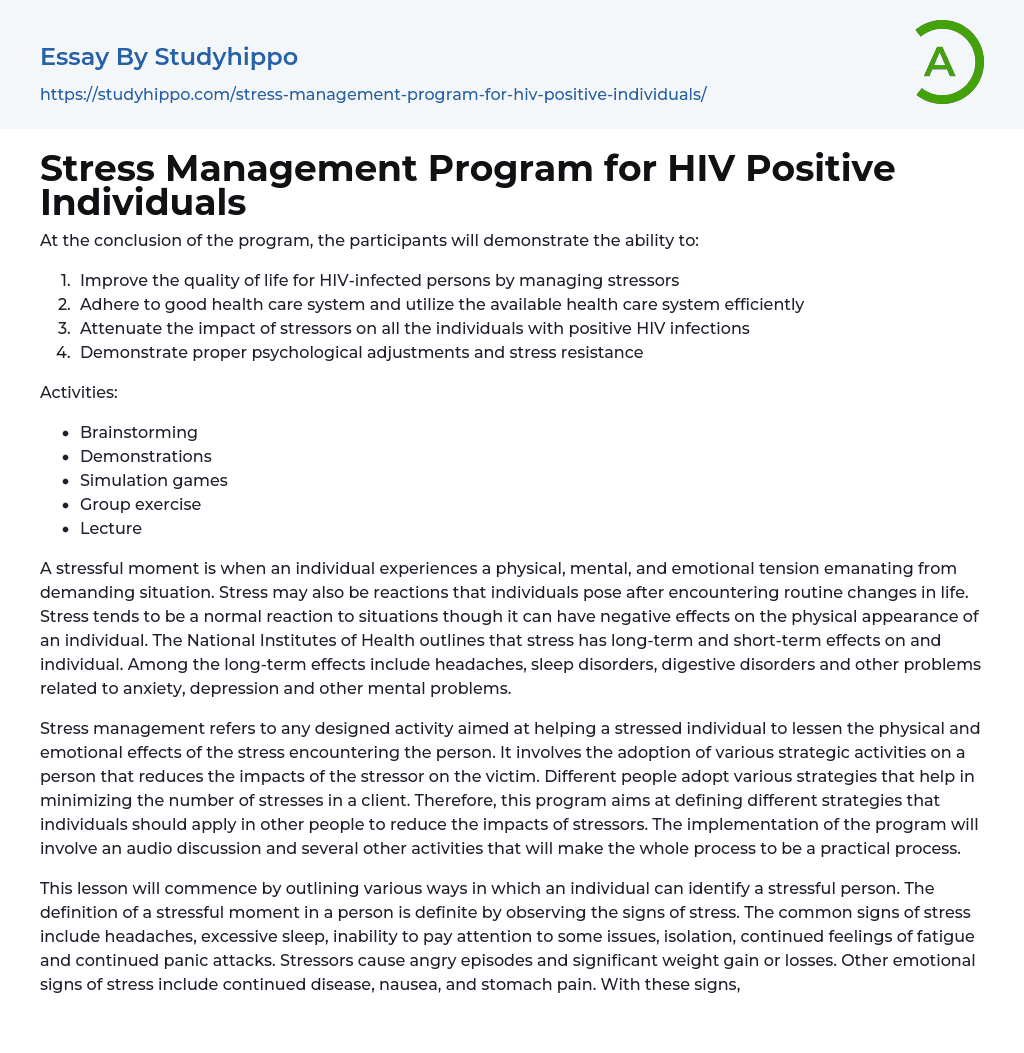

Stress Management Program for HIV Positive Individuals Essay Example
Upon program completion, participants will develop the skills to improve the well-being of individuals with HIV by effectively managing stressors, adhering to good healthcare systems, and efficiently utilizing available resources. They will also minimize the impact of stress on those with positive HIV infections and demonstrate proper psychological adjustments and resilience.
The program includes brainstorming, demonstrations, simulation games, group exercise, and lectures.
A stressful moment occurs when an individual experiences physical, mental, and emotional tension due to a demanding situation. It can also be a reaction to routine changes in life. Although stress is a normal response to situations, it can have negative effects on an individual's physical appearance. According to the National Institutes of Health, stress has both short-term and long-term effects on an individual's well-being. These effects include headaches, sleep disorders,
digestive issues as well as anxiety-r
elated problems such as depression or other mental health conditions. Stress management involves various activities aimed at helping individuals alleviate the physical
and emotional consequences they experience from stress.
The main objective of the program is to implement strategic activities that can help individuals in reducing the adverse effects of stressors. It aims to define and suggest different strategies for people to employ in order to decrease stress levels. The program comprises an audio discussion and practical activities, aiming to attain positive results.
Within this lesson, we will examine various approaches for identifying stress in individuals. By observing stress symptoms, it becomes feasible to identify when someone is undergoing a period of intense stress. Common signs of stress consist of headaches, excessive sleep, trouble focusing, avoiding social situations, ongoing exhaustion, and recurring panic attacks. Stressful situations can additionally result in outbursts of
anger and significant weight fluctuations. Furthermore, individuals encountering stress may exhibit emotional indications like frequent sickness, experiencing nausea, and abdominal pain. These indicators enable us to differentiate between individuals dealing with stress and those who are not.
People living with HIV-positive infection frequently exhibit specific signs such as loss of weight, persistent exhaustion, and withdrawal from social activities. Consequently, stress management seeks to support these individuals in conquering the difficulties linked to stress. A fundamental element of this program involves understanding the consequences of stress, which can be either immediate or prolonged. Immediate effects encompass challenges in fulfilling obligations and sustaining personal connections. The pressure felt during this timeframe often results in a feeling of loneliness, leading to relationship problems.
The significant long-term consequences of stress, such as high blood pressure, cardiovascular disease, stroke, and a weakened immune system, have been proven by studies. In fact, stress has been found to play a role in 60% of deaths among individuals with HIV infections in the United States. However, mortality rates can be greatly reduced among people with HIV infections through the implementation of effective stress management interventions.
Components of Stress Management
For effective stress management, there are various techniques that can be used. Cognitive strategies, relaxation techniques, and imagery exercises are considered reliable methods. Additionally, benefits can also be achieved through assertiveness training, goal setting, time management skills, and problem-solving approaches.
Cognitive strategies are concerned with identifying and adjusting negative thinking that affects a client's performance. According to Albert Ellis and Aaron Beck, individuals with HIV have different irrational thoughts and dysfunctional beliefs that replace realistic and positive thoughts. They suggest that people living with HIV have difficulty making realistic
decisions due to their irrational thinking. Therefore, a cognitive strategy for managing stress should involve an activity that promotes positive thoughts and explores common stressors for these clients. The intervention begins by identifying problematic thoughts and beliefs that may contribute to cognitive difficulties for the client.
This strategy involves evaluating clients' performance and addressing the most difficult situations encountered by individuals with HIV. The stress manager's responsibility is to stop negative thoughts and replace them with motivating ideas, encouraging clients to concentrate on activities that promote an active life. Stopping negative thoughts should include using success-oriented thoughts to cultivate a positive mindset. Implementing positive self-talk may also be necessary for managing stress, as it enhances client focus and self-assurance.
Treatment for Stress
An important intervention in effective stress management for individuals who are HIV-positive is treating their stress.
Cognitive-Affective Stress management is the most effective approach for stress treatment and enhancing efficiency. It emphasizes equipping individuals with cognitive skills to manage emotional arousal. The treatment entails guiding patients in imagining distressing situations, leading to reduced anxiety levels. Moreover, patients acquire coping techniques like self-talk to alleviate psychological distress triggered by stress. Encouraging clients to engage in activities such as humor and acceptance fosters active coping strategies that improve mental well-being compared to negative methods.
Additionally, offering social support is a vital approach to supporting individuals with HIV in managing their stress. This provision of social support is advantageous as it can aid the person in improving their mental well-being and minimizing the adverse effects of stress.
Conclusion
The above discussion illustrates that coping with stress, especially for those with HIV infection, presents a demanding challenge. Therefore, infected individuals require crucial assistance from
others to effectively navigate these difficult moments. This assistance should involve implementing proactive coping strategies such as problem-solving techniques. It should also involve enhancing emotion regulation skills, teaching cognitive restructuring techniques, and promoting positive automatic thoughts.
By teaching clients different relaxation techniques, they can effectively recover from anxiety and other psychological issues they may experience in life. These strategies enable individuals to make significant improvements in managing anxiety, perceiving stress, and enhancing their overall psychological well-being.



